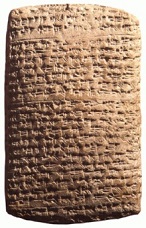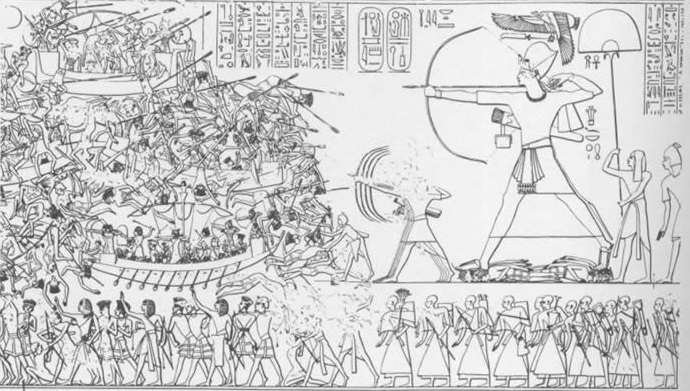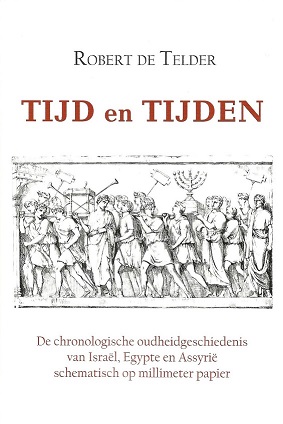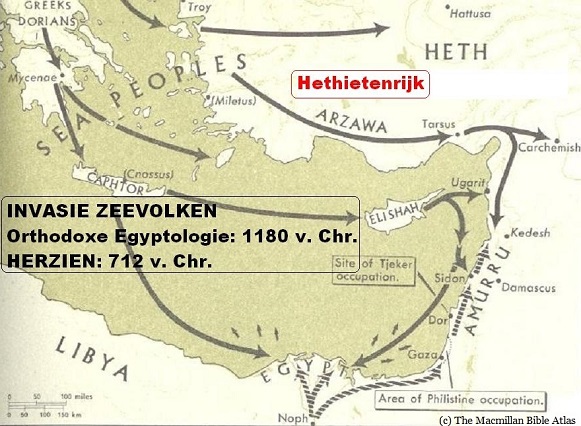|
De Amarnabriefwisseling heeft
op dit blog al enkele malen de aandacht gehad. Het laatste artikel dateert van 13-05-2015: de Amarna-brieven van
Rib-Addi aan farao Nafoeria alias Achnaton. Zie link: http://www.bloggen.be/robertdetelder/archief.php?startdatum=1431295200&stopdatum=1431900000

De Amarnabriefwisseling in de
vorm van kleitabletten bevat de diplomatieke correspondentie van de vazallen
van farao in Kanaän, Assyrië, Babylon, Hettietenland en de Egeïsche wereld. Als
een gevolg van de revisie van de geschiedenis van de oudheid verhuist de
Amarnaperiode op de tijdsbalk van de dertiende eeuw v. Chr. naar de achtste
eeuw v. Chr. De vermeende Sothis-kalender van de orthodoxe Egyptologie is
onderuitgehaald en de Egyptische dynastieën opnieuw op de tijdsbalk via
betrouwbare ankerpunten, herschikt. Op deze manier belandde ook de twintigste
dynastie met als toonaangevende farao Ramses III, in de achtste eeuw v. Chr. (Zie
TIJD en TIJDEN, 2015, blz. 307-311) Ramses III is vooral bekend vanwege een
invasie van zeevolken in Egypte en de Levant die hij afgeslagen heeft. Over de
invasie van de zeevolken schreef ik eerder op dit blog op 24-03-2015 een
artikel: Ramses III en de Zeevolken. Zie link: http://www.bloggen.be/robertdetelder/archief.php?startdatum=1427065200&stopdatum=1427670000

De geschiedenis van de oudheid
is als een fragmentarische puzzel die in elkaar gestoken moet worden.
Voorwaarde tot succes is dat men het juiste plaatje heeft. Als een gevolg van
het corrigeren en schuiven op de tijdsbalk met de Zeevolken én met de
Amarnatijd, komen enkele puzzelstukjes samen. Puzzelstukjes die in het
orthodoxe model niet ingevuld geraken.
Zo zijn er namelijk enkele
verwijzingen naar zeevolken in de EA Amarna-briefwisseling te vinden. Het zijn
de volgende vazallen van Farao die naar de zeevolken verwijzen: Rib Addi van
Goebla (Jizreël), Abi Milki van Tyrus en de koning van Alashija of Cyprus. Zij
verwijzen naar de Shardana, naar de Danuna en naar de Lukka. Naar de Shardana
verwijst Rib Addi drie maal in zijn bewaarde brieven aan farao. De orthodoxe
Egyptologie verklaart dat deze Shardana hoogstwaarschijnlijk (volgens hun visie)
niets van doen hebben met de zeevolken. Een verplichte logische redenering van,
hen aangezien de bestaande tijdskloof die er volgens hun constructie bestaat,
tussen beide groepen. EA81 is een verzoek van Rib Addi, alias koning Hosea van het
tienstammenrijk, aan de farao van Egypte om hulp in een conflict met Abdi
Ashirta, de heerser van Amoeroe. Rib Addi verzoekt farao in de brief om het
zenden van boogschutters ter bescherming van zichzelf tegen Abdi Ashirta en
zogenaamde overlopers. En dan verwijst Rib Addi een eerste maal naar een
Shardana die overgelopen zou zijn naar Abdi Asjirta en de context suggereert
dat de Shardana een soort huurlingen waren van de vazallen van farao in
Klein-Azië. Hierna de volledige brief in het Engels:
EA 81
{Rib-Hadda say}s
to {his} lord, {king of all countries, Great King, K}ing of Battle: May the
Lady of Gubla grant power {to the kin}g, {my lord}. I fa{l}l {at the feet} of
my lord, my {Sun}, 7 times and 7 times. 6-13 {May} the king, my lord,
know that the war of 'Abdi-Ashirta
is {se}vere, {and} he has taken all my cities {for} himself. Gubla and Batru{na
re}main to me, and he strives to take the two towns. He said to the men {of Gubl}a, "{Ki}ll your lord and be join{ed} to
the 'Apiru like Amm{iya}." 14-24 {And so} they became
trait<ors> to me. A man with a bronze dagger : pat-{r}a {at}tacked m{e}, but
I ki{ll}ed him. A Shirdanu {wh}om I know g{ot away t}o 'Abdi-Ashirta. At
his order was this {de}ed done! I have stayed {like th}is in my city and done nothing. I am unable to go out {into the
countryside, and} I have written to the palace, {but you do not re}ply {to me}.
I was struck {9 ti}mes. 25-33 {According}ly, I f{ear for} my life. {And
I have writt}en re{peatedly to the palace}, "Do not {be negligent. Why are you ne}gligent o{f the distress afflictingme? I}f within these two months there are no archers, then {. . .} May he
not fall {upon} my {city} and take me. I h{avewritten to the
pal}ace. What <am I to say> to my pea{santry}? 34-41 Like a bird
in a trap : ki-lu-bi (cage), so
are they in {Gubl}a. "{Fo}r l{ac}k of a cultivator their {field} is {li}ke
a woman without a husband." {Their sons, their} dau{gh}ters, {the
fur}nishings of their houses are gone, {since they have been s}old {i}n the
land of {Ya}rimuta {for} provisions to keep them alive. 41-47 {I} was the one that said to them, "My
god {is send}ing archers." Since they (now) kno{w that}
there are none, they have tu{rned
against} <u>s. If within two
months archers do not come ou{t}, then {'Ab}di-Ashirta will certainly come up
and take the two t{owns. 48-51 Pre}viously Sumur (Samaria) and {its} men were {st}rong, and there wa a
{gar}ison with us. Wh{at} can I {d}o by my{sel}f? 52-59 . .
De tweede en derde maal dat Rib Addi
naar de Sjardana verwijst is in de
brieven genummerd EA122 en EA123. Opnieuw verzoekt Rib Addi farao om hulp tegen
aanvallers. Ditmaal komt de dreiging van Pihura, een andere vazal van farao in
de regio. Pihura heeft drie onderdanen van Hosea gevangengenomen en een aantal Sjardana gedood. Rib Addi eist dat
farao hem zou beschermen en dat de weggevoerde gijzelaars zouden mogen
terugkeren. De rol van de Sjardana
is niet onmiddellijk duidelijk maar het lijkt er op dat zij een soort militaire
activiteit uitvoeren. Hierna de betreffende brieven in het Engels:
EA
122
Rib-Hadda writ{es
t}o his lord, king of all countries, {Great} King, King of Battle: May the Lady
of Gubla grant power to the king, my lord. I fall at the feet of my lord 7
times and 7 times. 9-19 As to
the king's saying, "Guard yourself," consider that previously, in the
days of my ancestors, there was a garrison of the king with them and property
of the king was at their disposal, but as far as I am concerned, there are no
provisions from the king at my dis{pos}al, and there is no garrison of the king
with me. 19-31 I must guar{d
mys}elf by myself. . . . There is a garri{son} . . . of the king with him,
and there are pro{visi}ons from the king at his disposal, but for me there is
neither garrison nor provisions from the king. 31-39 Pahura has
committed an enormity against me. He sent Suteans and they killed Shirdana-people. And he brought 3 men into Egypt. How long has the city been
enraged at me! 40-49 And indeed
the city keep saying, "A deed that has not been done since time immemorial
has been done to us!" So may the king heed the words of his servant and
send (back) the men, lest the city revolt. What am I to do? 50-55 Listen to m<e>. For <my> sake, do not refuse! {But whether} the men are at court o{r n}ot, listen to
me. I keep writing like tis to the palace, but <my> w<ords> are
<not> heeded.
EA 123
Rib-Hadda writes to his lord, Great King, king of all
countries, King of Battle: May the Lady of Gubla grant power to the king, my
lord. I fa<ll> at the feet of my lord, <my> Sun, 7 times and 7
times. 9-15 A deed that has not been done from time
immemorial has been done to Gubla. Pihura
{s}ent Suteans; they kill{ed} Shirdana-people, 16-21
{t}ook 3 men, and brought them in{to} Egypt. 22-28 {If} the king, {my} lord, does not se{nd} them (back), there
is {su}rely going to be a revolt against m{e. I}f the ki{ng}, my {lor}d, loves
{his} loya{l} servant. {then} send (back) the {3} men that I may live and guard
the city for the king. 29-37 And
as to the king's writing, "Guard yourself," with what am I to guard?
Send the 3 men whom Pihura brought in and then I will survive: 'Abdi-Ashirta,
Yattin-Hadda, 'Abd<i>-Milki. 38-43
{Wh}at are the sons of 'Abdi-Ashirta that they have taken the land of the king
for themselves? May the king send
archers to {take} them.
Een ander bekend volk
van de zogenaamde Zeevolken waar in de Amarna-briefwisseling naar verwezen
wordt, zijn de Danuna. In brief
(kleitablet) EA151 geschreven door Abi Milku van Tyrus, verzoekt de vazal van
farao in Tyrus, om hulp tegen een agressor genaamd Zemredda uit Sidon.
Daarnaast beschrijft de vazal de toestand in zijn gebied en vermeld de dood van
de koning van de Danuna en de
vreedzame opvolging door diens broer. De brief beschrijft de Danuna als een
belangrijk volk, geregeerd door een koning in een specifiek gebied. Verder
beschrijft de vazal Abi Milku de vernietiging van het paleis te Oegarit door
vuur. Hierna de volledige brief in het Engels:
EA 151
To the king, my Sun, my god, my gods: Message of Abi-Milku, your servant. I fall at the
feet of the king, my lord, 7 times and 7 times. 4-11 I am the dirt under
the sandals of the king, my lord. I am indeed guarding carefully the city of
the king that he put in my charge. My intention has been to go to see the face
of the king, my lord, but I have not been able, due to Zimredda of Sidon. 12-24 He heard that I was going to Egypt,
and so he has waged war against me. May the king, my lord, give me 20 men to
guard the city of the king, my lord, so I can enter before the king, my lord,
to behold his gracious face. I have devoted myself to the service : u-bu-di of the ki{ing}, my lord. May the ki{ng}, my lord, ask
his commissioner whether I have devoted myself to the king, my lord. 25-34
I herewith send my messenger t{o the kin}g, my lord, and may {the king}, my
lord, send {his messenger and} his ta{bl}et t{o me}, so I may enter before the
king, my lord. 35-48 May {the
king, my lord}, not abandon his servant. May the king, my lord, give
{his} attention and gi{ve} water for o{ur} drink and wood to his servant.
The king, my lord, knows that we are situa{te}d on the sea; we have neither
water nor wood. I herewith send Ilumilku as messenger to the king, my lord, and
I give 5 talents of bronze, ma<ll>ets, (and) 1 whip. 49-58 The king, my lord, wrote to me,
"Write to me what you have heard in Canaan." The king of Danuna died; his brother became king after his
death, and his land is at peace. Fire destroyed the palace at Ugarit; (rather), it destroyed half of
it and so hal<f> of it has
disappeared. 59-70 There are no Hittite troops about. Etakkama, the prince of Qidshu, and Aziru are at war; the war is with Biryawaza. I have experienced the
injustices of Zimredda, for he
assembled troops and ships from the cities of Aziru against me. Is it good that a palace attendant of my lord should become frigh{tened}? All have
become frightened. May the king give his attention to his servant and return : yu-sa (come forth).

Over het einde van Oegarit schreef ik een
hoofdstuk in TIJD en TIJDEN, 2015, blz. 323. Zie link: Zie
link: http://boekscout.nl/shop/ViewProduct.aspx?bookId=5579
Het derde volk van de
zeevolken waar naar verwezen wordt zijn de Lukka.
Het is de koning van Alashija die naar dit zeevolk verwijst. Klaarblijkelijk
had farao de Cyprioten beschuldigd van het aanvallen van zijn kustlijn samen
met de Lukka. De koning van Alashija verdedigde zich door te stellen dat zijn
land zelf het slachtoffer was van veelvuldige raids door de Lukka. Dit laatste
past wel bijzonder mooi in de geschiedenis van de invallen van de zeevolken. Hierna de
betreffende brief:
EA 38
Say to the king of
Egypt, my brother: Message of the king
of Alashiya, your brother. For me all goes well, and for you may all go
well. For your household, your chief wives, your sons, your horses, your
chariots, among your numerous troops, in your country, among your magnates, may
all go very well. 7-12 Why, my brother, do you say
such a thing to me, "Does my brother not know this?" As far as I am
concerned, I have done nothing of the sort. Indeed, men of Lukki, year by year, seize villages in my own country.
13-18 My brother, you say to me, "Men from your country were with
them." My brother, I myself do not know that they were with them. If men
from my country were (with them), send (them back) and I will act as I see fit.
19-22 You yourself do not know men from my country. They would not do such a thing.
But if men from m country did do this, then you yourself do as you see fit. 23-26
Now, my brother, since you have not sent back my messenger, for this tablet it
is the king's brother (as messenger). L{et} him write. Your messengers must
tell me what I am to do. 27-30 Furthermore, which ancestors of yours did
such a thin<g> to my ancestors? So no, my brother, do not be concerned.

De conclusie moet zijn dat de Zeevolken
contemporain met de regeerperiode van Amonhotep III en IV, waren. Beide groepen zijn in
de herziening van de geschiedenis van de oudheid, via de eerder behandelde
sleuteljaren in de achtste eeuw voor Christus, op de tijdsbalk verankerd. In de
conventionele egyptologie gebaseerd op een vermeende Sothis-kalender, is de
verwijzing naar zeevolken in de Amarna-briefwisseling een anomalie.
De betreffende Amarna-brieven
geven ons ook inzicht in de geschiedenis van de zeevolken naar de aanloop van invasie
van Klein-Azië en Egypte. Nog later in de zevende eeuw v. Chr. zijn de Sjardana
ook terug te vinden als de persoonlijke lijfwacht van Ramses II. Zie het
artikel van 14-01-2015 op dit blog:
Ramses II en de slag bij Kadesj. Zie link: http://www.bloggen.be/robertdetelder/archief.php?startdatum=1421017200&stopdatum=1421622000
Wordt vervolgd
Met vriendelijke
groet,
Robert De Telder
|

